Vaccines
A Vaccine Trial for CLL Patients
Finally, It's Our
Turn ...
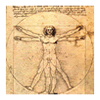 Genitope
Corp. has announced a clinical trial of their MyVax proprietary
vaccine technology for untreated, early stage CLL patients. We
examine this promising technology and the structure of the
Genitope clinical trial
in our new article,
A
Vaccine Trial for CLL Patients.
Genitope
Corp. has announced a clinical trial of their MyVax proprietary
vaccine technology for untreated, early stage CLL patients. We
examine this promising technology and the structure of the
Genitope clinical trial
in our new article,
A
Vaccine Trial for CLL Patients.
Case Studies
Forest Bump on His Experience in FCR Lite Trial
The Road Turns Less Bumpy for Our Hero
 Our
intrepid volunteer, thinly disguised as "Forest Bump", reports
on his experience
as a participant in the "FCR Lite" clinical trial being
conducted at the University of Pittsburgh Cancer Institute.
Forest, you will discover, has a unique personality and view of
life. We hope his tale,
Forest Bump, will be useful to those interested in a
"lighter" version of the widely used FCR protocol.
Our
intrepid volunteer, thinly disguised as "Forest Bump", reports
on his experience
as a participant in the "FCR Lite" clinical trial being
conducted at the University of Pittsburgh Cancer Institute.
Forest, you will discover, has a unique personality and view of
life. We hope his tale,
Forest Bump, will be useful to those interested in a
"lighter" version of the widely used FCR protocol.
Rituxan Therapy
Update on New Adverse Effects
Harvey Runs into a Road-block
 Since our hypothetical patient Harvey has developed a modest following of his own,
our readers will be interested in some new developments.
Harvey’s experience coincides with recently published reports on
new adverse effects of Rituxan therapy.
While the post-marketing surveillance of Rituxan has so far identified only a small percentage of patients
having these serious adverse effects, the danger is high and very real for these patients
and therefore worth discussing. Find the details in our next installment of the Harvey Saga,
Harvey Runs into a Road-block.
Since our hypothetical patient Harvey has developed a modest following of his own,
our readers will be interested in some new developments.
Harvey’s experience coincides with recently published reports on
new adverse effects of Rituxan therapy.
While the post-marketing surveillance of Rituxan has so far identified only a small percentage of patients
having these serious adverse effects, the danger is high and very real for these patients
and therefore worth discussing. Find the details in our next installment of the Harvey Saga,
Harvey Runs into a Road-block.
Therapy Choices
The Price of Collateral Damage
Winning the Battle
but Losing the War?
 Treating
CLL needs a different approach from treating more familiar solid
cancers. In this article we discuss the costs and benefits of
different strategies. If you are considering therapy this
article may help you understand your options a little better:
Winning the Battle but Losing the War?
Treating
CLL needs a different approach from treating more familiar solid
cancers. In this article we discuss the costs and benefits of
different strategies. If you are considering therapy this
article may help you understand your options a little better:
Winning the Battle but Losing the War?
Phytochemicals
The Latest on Green Tea
Details Make a
Difference
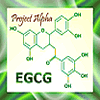 We report on
some recent information that has come to light on green tea
extracts and EGCG in cancer treatment and prevention and
provide an update on Project Alpha. Read the details in
Latest on Green Tea.
We report on
some recent information that has come to light on green tea
extracts and EGCG in cancer treatment and prevention and
provide an update on Project Alpha. Read the details in
Latest on Green Tea.
Clinical Trial Updates
The Search for Consistency in Reporting Results
Comparing Apples to
Kumquats and One Small Victory
 We
revisit two clinical trials discussed in past articles - FCR and
PCR. Comparing the results of these two trials is not easy but we nevertheless
make a brave attempt. We also discuss new trials in the offing
and report a welcome change in the design of the FCR + M
clinical trial. Sometimes it helps to tilt with windmills! Read
all about these things in Clinical Trial Updates.
We
revisit two clinical trials discussed in past articles - FCR and
PCR. Comparing the results of these two trials is not easy but we nevertheless
make a brave attempt. We also discuss new trials in the offing
and report a welcome change in the design of the FCR + M
clinical trial. Sometimes it helps to tilt with windmills! Read
all about these things in Clinical Trial Updates.
FCR
'Lite'
The Search for Efficacy with Lower
Toxicity
New Clinical Trial
Seeks the Goldilocks Solution
 A
new chemoimmunotherapy combination employing a higher dosage of Rituxan with
reduced dosages of fludarabine and cyclophosphamide, is
being tested in a clinical trial at the University of Pittsburgh
Cancer Institute. The investigators would like to achieve high
response rates with lower toxicity compared to FCR "Classic"
pioneered at M. D. Anderson Cancer Center. We review the
protocol and comment on the clinical trial design in our article
on FCR Lite. We also
interviewed Dr. Kenneth Foon, the principal investigator for
this clinical trial at UPMC.
A
new chemoimmunotherapy combination employing a higher dosage of Rituxan with
reduced dosages of fludarabine and cyclophosphamide, is
being tested in a clinical trial at the University of Pittsburgh
Cancer Institute. The investigators would like to achieve high
response rates with lower toxicity compared to FCR "Classic"
pioneered at M. D. Anderson Cancer Center. We review the
protocol and comment on the clinical trial design in our article
on FCR Lite. We also
interviewed Dr. Kenneth Foon, the principal investigator for
this clinical trial at UPMC.
RF Risks & Benefits
High Risk Groups Relapse Sooner
Further Analysis from
Ohio State
 As
patients it is important to us that our remissions be long and
that we maximize survival. These objectives are not always
captured by response statistics typically reported in
cutting-edge phase II clinical trials of new agents. In our
new article on RF Therapy, we
focus on a follow-up paper published by Drs. John Byrd, et. al.,
that goes straight to the point - CRs and PRs don't mean the
same thing to different prognostic risk groups, unlike the
proverbial rose that smells just as sweet to anyone who cares
to sniff.
As
patients it is important to us that our remissions be long and
that we maximize survival. These objectives are not always
captured by response statistics typically reported in
cutting-edge phase II clinical trials of new agents. In our
new article on RF Therapy, we
focus on a follow-up paper published by Drs. John Byrd, et. al.,
that goes straight to the point - CRs and PRs don't mean the
same thing to different prognostic risk groups, unlike the
proverbial rose that smells just as sweet to anyone who cares
to sniff.
HuMax Clinical Trial
Early Results from GenMab's
Anti-CD20 Monoclonal Antibody
The Half-Full Glass
 We
have high hopes for the new generation of monoclonal antibodies
that are under development and have discussed new trials under
way to test these agents in the clinic. Early results form one
such trial, involving GenMab's HuMax, were highlighted at the
2005 ASH conference in Atlanta. We offer our analysis of the
published results in Results from
GenMab's HuMax Clinical Trial.
We
have high hopes for the new generation of monoclonal antibodies
that are under development and have discussed new trials under
way to test these agents in the clinic. Early results form one
such trial, involving GenMab's HuMax, were highlighted at the
2005 ASH conference in Atlanta. We offer our analysis of the
published results in Results from
GenMab's HuMax Clinical Trial.
Avian Flu and CLL
Recognizing Vulnerabilities and
Taking Precautions
A Cave is No Place to
Live
 You
cannot have missed all the references to “bird flu”, "avian
influenza", “H5N1" and "pandemic flu” in the mainstream media.
There are as many opinions about bird flu as there are chickens
in China. We would like to add our two cents,
but strictly focused on issues
as they pertain to CLL patients,
the special risks we face as immune compromised individuals. We
also attach some up-to-date reference material that you might
find useful, especially when you talk to your doctors about your
needs. Read our article on
Avian Flu and CLL.
You
cannot have missed all the references to “bird flu”, "avian
influenza", “H5N1" and "pandemic flu” in the mainstream media.
There are as many opinions about bird flu as there are chickens
in China. We would like to add our two cents,
but strictly focused on issues
as they pertain to CLL patients,
the special risks we face as immune compromised individuals. We
also attach some up-to-date reference material that you might
find useful, especially when you talk to your doctors about your
needs. Read our article on
Avian Flu and CLL.
MCL - a Wolf in CLL Clothing
Accurate Diagnosis Leads to Better Treatment
Know the Name of Your
Enemy
 FISH analysis is one of the key prognostic tests used to identify the
type of CLL a patient has. However, the usual FISH panels
contain probes for only the most common cytogenetic
abnormalities. Rarer aberrations all get lumped together in a
basket labeled "normal". In this article,
MCL - a Wolf in CLL Clothing, we
examine how a probe for one such rare aberration, the "t(11:14)"
translocation, can yield valuable information in distinguishing
CLL from the more aggressive Mantle Cell Lymphoma, for which
treatment choices are not the same. Having this additional probe
included in your FISH test may well depend upon your negotiating
skills.
FISH analysis is one of the key prognostic tests used to identify the
type of CLL a patient has. However, the usual FISH panels
contain probes for only the most common cytogenetic
abnormalities. Rarer aberrations all get lumped together in a
basket labeled "normal". In this article,
MCL - a Wolf in CLL Clothing, we
examine how a probe for one such rare aberration, the "t(11:14)"
translocation, can yield valuable information in distinguishing
CLL from the more aggressive Mantle Cell Lymphoma, for which
treatment choices are not the same. Having this additional probe
included in your FISH test may well depend upon your negotiating
skills.
Targeting Bcl-2
Anti-death Protein Protects Cancer
Cells
We Review Clinical
Trials of Three Different Drugs
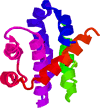 Clinical
trials are currently under way testing three different drugs to
suppress or attack a family of proteins that confers longevity
to CLL cells. We review the science behind this approach — and
give you our take on the drugs and the clinical trials — in
Targeting Bcl-2
Clinical
trials are currently under way testing three different drugs to
suppress or attack a family of proteins that confers longevity
to CLL cells. We review the science behind this approach — and
give you our take on the drugs and the clinical trials — in
Targeting Bcl-2
Flu Preparedness
Pneumonia Is the Single Biggest
Killer of CLL Patients
Some Pointers to
Resources and Education
 The
annual influenza season will soon be upon us. In
Flu Preparedness we offer
some research findings and practical advice on making it through
this season, whether we are faced with the common or garden
variety of flu - or a more ominous humanized version of the
avian flu.
The
annual influenza season will soon be upon us. In
Flu Preparedness we offer
some research findings and practical advice on making it through
this season, whether we are faced with the common or garden
variety of flu - or a more ominous humanized version of the
avian flu.
T-Cell Therapy
Clinical Trial at the Hutch Now to Recruit CLL Patients
Trained CD-20 Targeted Killer T-Cells to the Rescue
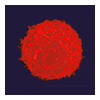 Another
interesting clinical trial will soon be open to CLL patients.
T-cells collected from patients are grown into large armies and
targeted to kill only cells with the CD-20 marker. These
activated and targeted killer T-cells will be used in the
clean-up of minimum residual disease left after more traditional
therapies. This innovative approach is the basis for a Phase I
clinical trial at the Fred Hutchinson Cancer Research Center in
Seattle. Read our review of this latest evolution in using CTLs
in
Autologous CD-20 Targeted T-Cell Therapy.
Another
interesting clinical trial will soon be open to CLL patients.
T-cells collected from patients are grown into large armies and
targeted to kill only cells with the CD-20 marker. These
activated and targeted killer T-cells will be used in the
clean-up of minimum residual disease left after more traditional
therapies. This innovative approach is the basis for a Phase I
clinical trial at the Fred Hutchinson Cancer Research Center in
Seattle. Read our review of this latest evolution in using CTLs
in
Autologous CD-20 Targeted T-Cell Therapy.
Clinical Trials
A Patient Sponsored Clinical Trial
Project Alpha Kickoff
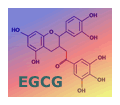 It has taken longer than we thought it would, but we are
pleased to announce Project Alpha is finally ready to start
recruiting patients. It represents a first of its kind
collaboration between patients and the research community.
Your hard earned money went into making this “EGCG trial” a
reality. You can read all the details of this newly
announced clinical trial at Mayo Clinic, Rochester MN, in
our new article,
Project Alpha Kickoff.
It has taken longer than we thought it would, but we are
pleased to announce Project Alpha is finally ready to start
recruiting patients. It represents a first of its kind
collaboration between patients and the research community.
Your hard earned money went into making this “EGCG trial” a
reality. You can read all the details of this newly
announced clinical trial at Mayo Clinic, Rochester MN, in
our new article,
Project Alpha Kickoff.
Clinical Trials
The Importance of Screening
FMC plus R: Brit.
Version
 Drawing
from the information sheet provided to patients in the UK FCM/FCM-R
CLL trial, we make some comparisons with the previously
discussed M. D. Anderson clinical trial (Mitoxantrone
to Turbocharge FCR Combo?). The issue
of pre-screening participants for cardiac conditions is being
addressed differently in the U. K. trial as you will see in "FMC
plus R - Brit. Version".
Drawing
from the information sheet provided to patients in the UK FCM/FCM-R
CLL trial, we make some comparisons with the previously
discussed M. D. Anderson clinical trial (Mitoxantrone
to Turbocharge FCR Combo?). The issue
of pre-screening participants for cardiac conditions is being
addressed differently in the U. K. trial as you will see in "FMC
plus R - Brit. Version".
Case Studies
A Few Short Years Can Change Some Important Things
Death by Conventional
Wisdom
 The conventional wisdom of a
few years ago can prove dangerous when doctors treat patients by
outdated rules of thumb. In
our critique of this case study reported by a professional
journal in 1999, we identify the necessity for both physicians
and patients to understand and employ modern risk-based
strategies in dealing with this varied disease.
Read "Death by
Conventional Wisdom" to understand why staying on top of new
developments is critical for your doctor — and even more so for
you.
The conventional wisdom of a
few years ago can prove dangerous when doctors treat patients by
outdated rules of thumb. In
our critique of this case study reported by a professional
journal in 1999, we identify the necessity for both physicians
and patients to understand and employ modern risk-based
strategies in dealing with this varied disease.
Read "Death by
Conventional Wisdom" to understand why staying on top of new
developments is critical for your doctor — and even more so for
you.
Clinical Trials
MD Anderson Responds
More on Mitoxantrone
plus FCR
 We
are pleased to report that Dr. Stefan Faderl, the principal
investigator at M. D. Anderson Cancer Center for the FCR+M and
Neulasta clinical trial, has responded to our letter and the
review of the clinical trial we published yesterday (see story
introduction below:
Mitoxantrone to Turbocharge FCR Combo?).
We offer our recommendations regarding this trial and a
commentary by Dr. Terry Hamblin in
More on
Mitoxantrone plus FCR.
We
are pleased to report that Dr. Stefan Faderl, the principal
investigator at M. D. Anderson Cancer Center for the FCR+M and
Neulasta clinical trial, has responded to our letter and the
review of the clinical trial we published yesterday (see story
introduction below:
Mitoxantrone to Turbocharge FCR Combo?).
We offer our recommendations regarding this trial and a
commentary by Dr. Terry Hamblin in
More on
Mitoxantrone plus FCR.
Clinical Trials
Mitoxantrone Is Added to FRC Regime
Kick It Up Another
Notch?
 We
review a new clinical trial currently recruiting patients at M.
D. Anderson Cancer Center. Our article, "Mitoxantrone
to Turbocharge FCR Combo?" is required reading for those
considering enlisting in the Anderson FCR+M clinical trial - or
for those simply interested in evaluating the risks and benefits
of enrolling in any CLL clinical trial.
We
review a new clinical trial currently recruiting patients at M.
D. Anderson Cancer Center. Our article, "Mitoxantrone
to Turbocharge FCR Combo?" is required reading for those
considering enlisting in the Anderson FCR+M clinical trial - or
for those simply interested in evaluating the risks and benefits
of enrolling in any CLL clinical trial.
CLL Overview Review
Experts Summarize the State of CLL Therapy
Where Are We?
 Drawing
from a group of top-rated experts, Dr Marco Montillo in Milan
has produced an overview of where we are in
understanding and treating CLL. Patients and their oncologists
should pay close attention to the historical evidence and
conclusions presented by this group. Read about it in "Where
Are We?"
Drawing
from a group of top-rated experts, Dr Marco Montillo in Milan
has produced an overview of where we are in
understanding and treating CLL. Patients and their oncologists
should pay close attention to the historical evidence and
conclusions presented by this group. Read about it in "Where
Are We?"
Graft versus Host Disease
Controlling this Killer is the Holy Grail of Transplants
GVHD in Allogeneic
Transplants
 Graft-versus-host-disease (GVHD) is an example of systemic
and potentially life threatening inflammation. It is one of
the major causes of death in stem cell transplants. Controlling
GVHD is the holy grail of all transplant
researchers. This article discusses the causes GVHD, and
some commonsense things you can do to protect yourself.
Graft-versus-host-disease (GVHD) is an example of systemic
and potentially life threatening inflammation. It is one of
the major causes of death in stem cell transplants. Controlling
GVHD is the holy grail of all transplant
researchers. This article discusses the causes GVHD, and
some commonsense things you can do to protect yourself.
Stem Cell Transplants
The Only Real Cure Out There, for Now
New Papers Spell Out
the Chances for Success
 As
the years go by, survival statistics from stem
cell transplants performed in the past have been accumulating.
We review the surprising results reported in two newly published
papers from the Hutch. Read more in our article,
The Only Real Cure Out There, for
Now.
As
the years go by, survival statistics from stem
cell transplants performed in the past have been accumulating.
We review the surprising results reported in two newly published
papers from the Hutch. Read more in our article,
The Only Real Cure Out There, for
Now.
Chemotherapy Trials
Hsp 90 and Its Inhibition by 17-AAG
An Important New Trial
Has Been Announced
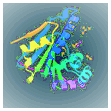 17-AAG
may turn out to be an important therapeutic drug for CLL. It has
an interesting mechanism of action and should in theory work
well in poor prognostic cases. An important new phase I trial of
17-AAG has been announced and is recruiting patients at OSU,
soon to be followed by Dana Farber. You can read all about it in
our article 17-AAG -
An Important New Trial Has Been Announced.
17-AAG
may turn out to be an important therapeutic drug for CLL. It has
an interesting mechanism of action and should in theory work
well in poor prognostic cases. An important new phase I trial of
17-AAG has been announced and is recruiting patients at OSU,
soon to be followed by Dana Farber. You can read all about it in
our article 17-AAG -
An Important New Trial Has Been Announced.
Chemotherapy
Latest on Candidates Flavopiridol and 17-AAG
Hope Springs Eternal
 The
patient community is ever hopeful about new drug candidates that
appear to have potential in the lab. In
Flavopiridol & 17-AAG
we review a paper reporting the disappointing results of an
earlier phase I/II clinical trial
of Flavopiridol that failed to show clinical activity when given
as a slow infusion - the research team has since gone on to a
bolus approach which may have more efficacy (see
Flavopiridol: A Drug That May
Save Lives). We also examine a new agent that is
receiving attention, 17-AAG.
The
patient community is ever hopeful about new drug candidates that
appear to have potential in the lab. In
Flavopiridol & 17-AAG
we review a paper reporting the disappointing results of an
earlier phase I/II clinical trial
of Flavopiridol that failed to show clinical activity when given
as a slow infusion - the research team has since gone on to a
bolus approach which may have more efficacy (see
Flavopiridol: A Drug That May
Save Lives). We also examine a new agent that is
receiving attention, 17-AAG.
Combination Immunotherapy
Campath plus G-CSF Can Be Dangerous
A Scary Story:
Telling It Like It Is
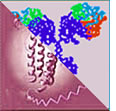 The
combination of Campath and G-CSF appears logical enough as an
approach to reaping the benefits of Campath therapy while
keeping the immune suppression and infections typically
associated with it under control. However, the co-administration
of G-CSF with intravenous Campath to patients enrolled in a
phase II trial at Ohio State produced unexpected and
discouraging results. The prompt publication of the results is a
credit to the Ohio State team. It is important that we
understand the results of this trial as we consider our therapy
alternatives. Read about it in
Campath plus G-CSF.
The
combination of Campath and G-CSF appears logical enough as an
approach to reaping the benefits of Campath therapy while
keeping the immune suppression and infections typically
associated with it under control. However, the co-administration
of G-CSF with intravenous Campath to patients enrolled in a
phase II trial at Ohio State produced unexpected and
discouraging results. The prompt publication of the results is a
credit to the Ohio State team. It is important that we
understand the results of this trial as we consider our therapy
alternatives. Read about it in
Campath plus G-CSF.
Physicians' Corner
Honokiol: An Interview with the Experts
We Talk to
Researchers at Harvard and Emory
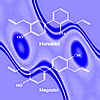 Following
up on our review of a recent important paper on the possible use
of honokiol from magnolia bark extract in CLL therapy, we
contacted the researchers to get the inside scoop. This compound
has the potential for significant efficacy in CLL, and its use
in traditional Chinese & Japanese medicine suggests few adverse
effects. Dr. David Frank of Harvard Medical School and Dr. Jack
Arbiser of Emory School of Medicine answer some of the questions
that interest us in this email
interview.
Following
up on our review of a recent important paper on the possible use
of honokiol from magnolia bark extract in CLL therapy, we
contacted the researchers to get the inside scoop. This compound
has the potential for significant efficacy in CLL, and its use
in traditional Chinese & Japanese medicine suggests few adverse
effects. Dr. David Frank of Harvard Medical School and Dr. Jack
Arbiser of Emory School of Medicine answer some of the questions
that interest us in this email
interview.
Phytochemicals
New Properties of Traditional Medicine Agent
Honokiol and Magnolol
 Magnolia
tree bark extract has been used for thousands of years in
Chinese and Japanese traditional medical practice, with
apparently little toxicity. A study conducted at Dana Farber has
established that Honokiol has selective cytotoxic properties
against B-CLL cells. The dosage required for anti-CLL activity will probably be higher
than that used in traditional medicine and human clinical
trials in CLL have yet to be conducted. However, the characteristics of
this agent are attractive. Read all about it in
Honokiol.
Magnolia
tree bark extract has been used for thousands of years in
Chinese and Japanese traditional medical practice, with
apparently little toxicity. A study conducted at Dana Farber has
established that Honokiol has selective cytotoxic properties
against B-CLL cells. The dosage required for anti-CLL activity will probably be higher
than that used in traditional medicine and human clinical
trials in CLL have yet to be conducted. However, the characteristics of
this agent are attractive. Read all about it in
Honokiol.
Therapy Choices
Restoring Humoral Functions in B-CLL
Possible Benefits
of IVIg
 Most
CLL patients have reduced immunoglobulin (Ig), the levels
dropping gradually over time.
Lack of proper B-cell function
in generating a wide repertoire of Ig needed is one of the
reasons why CLL patients get so many infections. This article,
Possible Benefits of IVIg,
describes what happens when B-cell function is compromised by
cancer or therapies used to control the cancer, causing
sub-normal Ig levels. One possible solution for this defect is,
of course, IVIg. Recent research suggests there may be even
more important and unexpected benefits to be gained from IVIg.
Most
CLL patients have reduced immunoglobulin (Ig), the levels
dropping gradually over time.
Lack of proper B-cell function
in generating a wide repertoire of Ig needed is one of the
reasons why CLL patients get so many infections. This article,
Possible Benefits of IVIg,
describes what happens when B-cell function is compromised by
cancer or therapies used to control the cancer, causing
sub-normal Ig levels. One possible solution for this defect is,
of course, IVIg. Recent research suggests there may be even
more important and unexpected benefits to be gained from IVIg.
Prognostic Indicators
Prognostic
Test Packages are Now Available
Quest Diagnostics Is
First to the Table
 Your
doctor can now order a package of CLL-specific prognostic tests
from the largest company in the medical test industry, Quest
Diagnostics, Inc. Doctors can now get the tests done as a
package deal - and at a reasonable cost to the patient. It has
been our crusade to take out some of the road blocks to make
prognostic testing accessible to local healthcare providers who
guide the therapy choices of their CLL patients every day. Read
about this important and very useful development in our article
on
Prognostic and Monitoring Tests. We provide all the
details of how to get the tests done and the logic you may need
to convince your doctor to order them.
Your
doctor can now order a package of CLL-specific prognostic tests
from the largest company in the medical test industry, Quest
Diagnostics, Inc. Doctors can now get the tests done as a
package deal - and at a reasonable cost to the patient. It has
been our crusade to take out some of the road blocks to make
prognostic testing accessible to local healthcare providers who
guide the therapy choices of their CLL patients every day. Read
about this important and very useful development in our article
on
Prognostic and Monitoring Tests. We provide all the
details of how to get the tests done and the logic you may need
to convince your doctor to order them.
Announcement
New Resources and Initiatives
CLL Global Research
Foundation
 A
new organization has been created to pursue and validate therapy
options for CLL. The
CLL Global Research Foundation,
under the leadership of Dr. Michael J. Keating of M. D. Anderson
Cancer Center, seeks "new,
effective, low toxicity treatments".
Among its objectives is the acceleration of new ideas and the
rapid transfer of laboratory results to clinical applications.
In an article titled
CLL
Global Research Foundation, we welcome this development and
discuss a proposal made by CLL Topics to this new, well-funded
entity that seeks a partnership with the patient community.
A
new organization has been created to pursue and validate therapy
options for CLL. The
CLL Global Research Foundation,
under the leadership of Dr. Michael J. Keating of M. D. Anderson
Cancer Center, seeks "new,
effective, low toxicity treatments".
Among its objectives is the acceleration of new ideas and the
rapid transfer of laboratory results to clinical applications.
In an article titled
CLL
Global Research Foundation, we welcome this development and
discuss a proposal made by CLL Topics to this new, well-funded
entity that seeks a partnership with the patient community.
New Clinical Trial at Mayo
Protocol for Previously Untreated Patients
Short Duration
Campath plus Rituxan
 A
new protocol combining short duration subcutaneous Campath with
standard dose Rituxan has been launched at the Mayo Clinic,
Rochester, MN. It targets previously untreated Rai Stage 0-II
patients. Read our review of the protocol and the relevant
detail and background in
Clinical Trial
to Test Rituxan plus Short Duration Campath.
A
new protocol combining short duration subcutaneous Campath with
standard dose Rituxan has been launched at the Mayo Clinic,
Rochester, MN. It targets previously untreated Rai Stage 0-II
patients. Read our review of the protocol and the relevant
detail and background in
Clinical Trial
to Test Rituxan plus Short Duration Campath.
Campath Therapy
Good News for the Tough Cases
The Half-full Glass
 Another
piece of solid clinical research with
important implications has just been published online in the
Journal of Clinical Oncology on Feb. 28, 2026. In it, Paul
Moreton, et. al., report on the results of a 7-year phase II
study involving late stage and refractory patients. The British
team concludes that eradication of minimum residual disease with
Campath has a surprisingly good effect on survival in this
cohort of tough cases. We review the Moreton article and offer
our analysis in Good
News for the Tough Cases.
Another
piece of solid clinical research with
important implications has just been published online in the
Journal of Clinical Oncology on Feb. 28, 2026. In it, Paul
Moreton, et. al., report on the results of a 7-year phase II
study involving late stage and refractory patients. The British
team concludes that eradication of minimum residual disease with
Campath has a surprisingly good effect on survival in this
cohort of tough cases. We review the Moreton article and offer
our analysis in Good
News for the Tough Cases.
Staging is Superseded
The New Think on CLL Is Finally Here
The Dawn of a New Era
 An
important new review article has been published in the New
England Journal of Medicine. The Rai/Binet staging systems have
been important in triggering therapy decisions. In this article
the authors, who include Dr. Kanti Rai himself, bluntly state
that the staging system with its emphasis on watch & wait should
be replaced by better methods using modern prognostic
indicators. We cover this important article as well as several
other related works in The Dawn of
a New Era.
An
important new review article has been published in the New
England Journal of Medicine. The Rai/Binet staging systems have
been important in triggering therapy decisions. In this article
the authors, who include Dr. Kanti Rai himself, bluntly state
that the staging system with its emphasis on watch & wait should
be replaced by better methods using modern prognostic
indicators. We cover this important article as well as several
other related works in The Dawn of
a New Era.
Prognostic Indicators
Progress in Getting the Tests Made Accessible
Our Quest For
Solutions
 The
value of getting the right prognostic tests done is slowly
gaining acceptance in the patient community. However, the
practical difficulties involved are numerous and each patient
has to deal with his or her providers as well as he or she can.
In this article, Progress
on Prognostics, we review our own progress in de-tangling
the logistical and communication nightmare for the patient community. In CLL, as
in life, what you get is what you negotiate - and we have been
busy.
The
value of getting the right prognostic tests done is slowly
gaining acceptance in the patient community. However, the
practical difficulties involved are numerous and each patient
has to deal with his or her providers as well as he or she can.
In this article, Progress
on Prognostics, we review our own progress in de-tangling
the logistical and communication nightmare for the patient community. In CLL, as
in life, what you get is what you negotiate - and we have been
busy.
Physicians' Corner
Progress in Finding a Cure
Are We There Yet?
 Professor Terry Hamblin needs no
introduction to CLL patients. His seminal work on the prognostic value of the
IgVH gene mutation status has become a cornerstone in the risk
stratification of CLL patients. In his article,
Are We There Yet?, Dr.
Hamblin discusses criteria for initiating treatment as well as
what treatment can and cannot do for the patient. He goes on to
review the current status of combination chemo-immunotherapy
clinical trials. Read this article for a candid assessment of where we are in the campaign to cure CLL.
Professor Terry Hamblin needs no
introduction to CLL patients. His seminal work on the prognostic value of the
IgVH gene mutation status has become a cornerstone in the risk
stratification of CLL patients. In his article,
Are We There Yet?, Dr.
Hamblin discusses criteria for initiating treatment as well as
what treatment can and cannot do for the patient. He goes on to
review the current status of combination chemo-immunotherapy
clinical trials. Read this article for a candid assessment of where we are in the campaign to cure CLL.
Nutrition & Chemoprevention
Omega-3 Fatty Acids
A Fishy Tale
 Much
current research is focused on the role played by
polyunsaturated fatty acids (PUFAs) in a very broad range of
cellular functions in humans. Our modern diet and agricultural
technology have created a substantial imbalance between the two
major groups PUFAs that we consume. Restoring that balance is
critical to our ability to avoid and fight cancer and other
diseases. In Omega-3 Fatty Acids
we review current scientific thought on the importance of
increasing our consumption of Omega-3 oils, derived mainly from
fish.
Much
current research is focused on the role played by
polyunsaturated fatty acids (PUFAs) in a very broad range of
cellular functions in humans. Our modern diet and agricultural
technology have created a substantial imbalance between the two
major groups PUFAs that we consume. Restoring that balance is
critical to our ability to avoid and fight cancer and other
diseases. In Omega-3 Fatty Acids
we review current scientific thought on the importance of
increasing our consumption of Omega-3 oils, derived mainly from
fish.
CLL Complications
Oral Mucositis Can Be Deadly
A Real Pain in the
Mouth
 Many
CLL patients experience painful sores and infections in their
mouths, especially when they go through chemotherapy. This
incidence of 'oral mucositis' can have serious consequences to
the quality of life and even survival of these patients. There
may be a few things you can do to help yourself - read about
them in A Real
Pain in the Mouth.
Many
CLL patients experience painful sores and infections in their
mouths, especially when they go through chemotherapy. This
incidence of 'oral mucositis' can have serious consequences to
the quality of life and even survival of these patients. There
may be a few things you can do to help yourself - read about
them in A Real
Pain in the Mouth.
Matching Made Simple
Is a Bone Marrow Transplant in
Your Future?
Allogeneic Stem
Cell Transplants Work Better with Closer Matches
 HLA
matching of the potential donor with the recipient is the first
step in allogeneic stem cell transplants, whether the stem cells
are obtained from an adult donor or from umbilical cord blood.
With increasing frequency, stem cell transplantation is viewed as an early alternative for those with
aggressive disease or high risk profiles, especially for
younger patients. Familiarity with the concept of tissue typing
will be useful as you embark upon the transplant journey. To take some of
the mystery out of this process we present
Matching Made Simple.
HLA
matching of the potential donor with the recipient is the first
step in allogeneic stem cell transplants, whether the stem cells
are obtained from an adult donor or from umbilical cord blood.
With increasing frequency, stem cell transplantation is viewed as an early alternative for those with
aggressive disease or high risk profiles, especially for
younger patients. Familiarity with the concept of tissue typing
will be useful as you embark upon the transplant journey. To take some of
the mystery out of this process we present
Matching Made Simple.
Monoclonal Antibodies
Sons of Rituxan and Campath
A New Generation
of More Effective Antibodies Makes It into the Clinic
 The
monoclonal antibodies Rituxan and Campath have changed the
landscape for CLL and a whole range of hematological conditions.
New improved versions of these monoclonal antibodies are now
coming out of the lab and into the clinic. In our article
Sons of Rituxan and
Campath, we examine the mechanisms by which these agents
achieve their effects - and the methods for increasing their
efficacy. Read about a new CD20 monoclonal antibody, HuMax from
GenMab, now in clinical trials in Europe and in the US and,
incidentally, satisfy your curiosity about why we have a picture
of a lobster gracing this paragraph.
The
monoclonal antibodies Rituxan and Campath have changed the
landscape for CLL and a whole range of hematological conditions.
New improved versions of these monoclonal antibodies are now
coming out of the lab and into the clinic. In our article
Sons of Rituxan and
Campath, we examine the mechanisms by which these agents
achieve their effects - and the methods for increasing their
efficacy. Read about a new CD20 monoclonal antibody, HuMax from
GenMab, now in clinical trials in Europe and in the US and,
incidentally, satisfy your curiosity about why we have a picture
of a lobster gracing this paragraph.
Meetings & Conferences
State of the Art in Hematology
ASH 2026
Highlights
CLL
Topics was able to field a small team of reporters at the 2026
ASH Annual Meeting and Exposition in San Diego. Rainy skies kept
us indoors attending the lectures and symposia - and a good
thing, too, since there was a lot of material to cover. In
ASH 2026
Highlights, we provide an overview of the proceedings and
touch on a few of the important developments presented at the
conference. Of course, many of these topics are worthy of more
in-depth analyses in the weeks to come.
Epigenetics
Genes Sleeping on the Job
New Therapies
Based on a Better Understanding of Cell Biology
 An interesting new clinical trial
has opened up for CLL patients, one that may have potential for
low toxicity as well as good efficacy. As a refreshing change
from the usual heavy doses of chemotherapy, this trial is based
on using very low doses of drugs, often as little as ten times
lower than the amounts used under standard regimens. The
rationale for this approach is equally interesting. The DNA in a
cell's nucleus is a vast library of information which normally
defines and regulates how the cell functions.
In cancer cells, however, the information retrieval mechanism is
often at fault. The idea here is to use just enough drugs to
correct this fault, and thereby allow the cancer cell to kill
itself. Click here to read
Epigenetics.
An interesting new clinical trial
has opened up for CLL patients, one that may have potential for
low toxicity as well as good efficacy. As a refreshing change
from the usual heavy doses of chemotherapy, this trial is based
on using very low doses of drugs, often as little as ten times
lower than the amounts used under standard regimens. The
rationale for this approach is equally interesting. The DNA in a
cell's nucleus is a vast library of information which normally
defines and regulates how the cell functions.
In cancer cells, however, the information retrieval mechanism is
often at fault. The idea here is to use just enough drugs to
correct this fault, and thereby allow the cancer cell to kill
itself. Click here to read
Epigenetics.
Therapy Choices
Trust but Verify
Shopping for the
Therapy that Is Right for You
 Picking your therapy based on the results
reported from clinical trials is not easy. You have to read the
results carefully - the devil is indeed in the detail. Comparing
trial results is only valid if the patient groups are well
matched between the trials - and sometimes the focus is on the
wrong result statistic. Unbiased, timely and complete reporting
of the results of human clinical trials is critical to
understanding the therapies out there - and your therapy
choices. Click here to read
Shopping for the
Therapy that is Right for You.
Picking your therapy based on the results
reported from clinical trials is not easy. You have to read the
results carefully - the devil is indeed in the detail. Comparing
trial results is only valid if the patient groups are well
matched between the trials - and sometimes the focus is on the
wrong result statistic. Unbiased, timely and complete reporting
of the results of human clinical trials is critical to
understanding the therapies out there - and your therapy
choices. Click here to read
Shopping for the
Therapy that is Right for You.
Rituxan Warning - Rituxan in the News
The Risk of Hepatitis B Virus Reactivation During
Rituxan Therapy; New Therapy Combining Rituxan with Fenretinide
The FDA, Genentech and
Biogen-Idec Issue Warning
Topics Alert
Number 49 identifies another warning issued by the drug industry.
This latest is the warning regarding the risk of
hepatitis B virus reactivation during Rituxan therapy. This is not good
news, but it is not the end of the world, either - just one more thing
to remember and track.
On a positive note, our
follow-up article,
Rituxan in the News, examines a promising new combination therapy
with Rituxan and a new agent for CLL,
Fenretinide.
This drug is an analog of Vitamin A, with a long track record of low
toxicity.
Those Aches and Pains
The Effects of a Hidden Deficiency May be Wrongly
Blamed on CLL
This Topics Alert
Identifies an Available Fix for What Possibly Ails You
One of the common mistakes
we (and our doctors!) make is attributing everything that goes wrong to
CLL - such as muscle pains and the aches in our bones.
You could be suffering
from something that can be very easily corrected, a real cheap fix. Not
only does it not cost a lot, it is not even toxic (isn't that a welcome
change from the usual caveats with chemo drugs?), and it might even help
you fight the CLL. But don't do this without medical supervision. What
is this drug? It is called vitamin D3. Read our Alert titled 'Those
Pesky Aches and Pains' for some interesting pointers.
Target Mitochondrion
Promising New Approaches Bypass the Usual Cellular
Control Points and May Level the Playing Field for Bucket C Patients
We Review New Research
Articles that Focus on Attacking Mitochondria in B-CLL Cells
Several recent research articles have
opened up exciting new opportunities in the treatment of CLL. These
feature new small molecule drugs that take an entirely different
approach to targeting CLL cells. In this new approach to treating CLL,
it seems to make no difference if you are IgVH mutated or unmutated,
CD38 positive or not, chemo-naïve or have been through the wars with
every chemotherapy drug known to man. In fact, there are some
indications that heavily pretreated and late Rai stage patients may
respond better to this approach.
To learn more, read 'Exciting
New Drugs on the Horizon'.
ZAP-70 & IgVH Gene Mutation Status
Two Prognostic Indicators Worth Understanding
We Compare the Value of
These Indicators in Identifying a Patient's Risk Category
These two indicators, in combination with FISH
analysis to pinpoint the chromosomal aberration that is at the root of
the CLL, go a long way toward defining the risk category of a given
patient. In
ZAP-70
and IgVH Gene Mutation
we review the current research on the prognostic value of these
two important tests.
AIHA: Auto-Immune Hemolytic Anemia
Important Insight
We Review the Causes and
Mechanisms of AIHA and Suggest Some Strategies to Deal with It
AIHA affects a significant part of the CLL
population, particularly those with advanced disease. Understanding the
causes of the disorder is critical to dealing with it. In
AIHA: Auto-Immune Hemolytic Anemia, we review the relevant research and make some
suggestions.
Monoclonal Redux
Campath plus Rituxan as Therapy
We Review the M. D.
Anderson Clinical Trial of the R+C Combination Protocol
These two potent monoclonal antibodies in CLL
treatment hold great promise by themselves and in combination with other
agents. The logical question of whether they work well together, or have
synergies in their method of action, are important ones to answer if we
are to make the best use of our options. In
immunotherapy, however, things are not always as they seem, as shown by
this clinical trial conducted by M. D. Anderson. Negative results, while
disappointing, still have value in our understanding of the disease and in
plotting treatment strategies.
Diagnosing Your Doctor
A Patient's Viewpoint
Why Patients Need to Be
Proactive: The Life You Save Could Be Your Own
Former newspaper reporter and editor David Arenson
analyses the weak points in many relationships between CLL patients and
their doctors and makes some constructive suggestions for improvement. In
his article titled "Diagnosing
Your Doctor" he identifies the qualities and approach he feels are
necessary on both sides for CLL patients and their doctors to develop interactive and effective relationships.
Familial CLL
Insight, Advances and Research
Tracking Down Clues in
Population Data
Dr. Tim Call is a
hematologist/oncologist at Mayo Clinic, Rochester, MN and an Assistant
Professor of Medicine at the Mayo Clinic College of Medicine. He has
done much important work in the area of familial CLL and lymphoma, and
is responsible for developing a database at Mayo Clinic on the
familial incidence of B-cell malignancies including CLL, B-cell
lymphomas and a few related diseases. You might recall his name as an
author on the Mayo Best Practices article -
Current Approach to Diagnosis and Management of CLL. More details
about him are provided in his official Mayo Clinic
profile. We are pleased that he has written this article,
Familial CLL, addressed to the patient community. We strongly encourage that our readers
register in one of the recommended databases when appropriate.
Rituxan plus Neupogen
Improving Efficacy and Reducing
Neutropenia
New
Information on Neupogen as Booster to Rituxan Monotherapy
In this article,
Neupogen
as Booster to Rituxan Monotherapy, we discuss one method of
getting maximum mileage from Rituxan monotherapy. First we
examine the impressive results of a major Phase 3 study from
Amgen on the use of G-CSF (Neupogen) in moderately
myelosuppressive (breast) cancer therapy, in which the authors
conclude their logic would hold for any cancer therapy with the
risk of neutropenia. We also cover a wide range of abstracts
that point to the important role played by neutrophils in
the depth and duration of remissions produced by Rituxan in CLL
and in the avoidance of resistance to Rituxan therapy. We also
discuss the risks involved and conclude with a plea for the
rapid publication of critical results from clinical trials.
